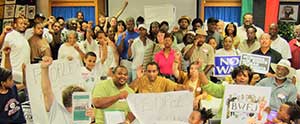North Carolina People’s Assembly generates plan of action
By
Dante Strobino
Raleigh, N.C.
Published Aug 14, 2008 10:34 PM
On Aug. 9 over 75 African-American workers and community activists converged in
Raleigh, N.C., for a People’s Assembly. Initiated by the Black Workers
for Justice, these assemblies are part of the Historic Thousands on Jones St.
(HKonJ) movement that brought over 5,000 people to the streets in Feb. 2007 and
2008 around a powerful 14-point People’s Agenda.
|
People’s Assembly, Raleigh, N.C.
Photo: Ajamu Dillahunt
|
The People’s Assemblies are an effort by coalition partners to bring this
agenda to life in local areas throughout the state and throughout the year and
to broaden the participation.
The 14-point People’s Agenda includes a broad range of issues affecting
the African-American community and workers, including police brutality,
education, health care, the war, the economy, reform of the electoral system
and collective bargaining rights for public-sector workers.
One highlight of the Aug. 9 People’s Assembly was the large delegation of
striking Moncure Plywood workers from International Association of Machinists
Local W369 in Chatham County. The strike began on July 20 after bosses gave a
take-it-or-leave-it last contract offer that would mandate 60-hour work weeks,
weaken the seniority clause in a way that could lend itself to favoritism,
increase health insurance premiums by over 300 percent, give fewer holidays off
and without regard to safety violations. Workers also raised concerns about
unfair labor practices.
IAM Local W369 President Lewis Cameron expressed concern to Workers World that
community members may think they were striking just to get more money. Although
they deserve higher pay, he reiterated, “We are just trying to secure our
rights to a decent job and to work with dignity.”
The workers were received with warm support from other People’s Assembly
delegates, who voted to participate in the picket line on Aug. 27, the day
before Barack Obama is giving his acceptance speech, to mark the 45th
anniversary of Dr. Martin Luther King Jr.’s “I Have a Dream
Speech” and to continue the legacy of Dr. King, who stood with striking
workers in Memphis, Tenn., in the days before his assassination.
Delegates broke out into committees based on areas of interest. The anti-war
committee, led by Khalilah Sabra of Muslim America Society Freedom Foundation,
discussed the escalation of war on Iran and the need to divert the Pentagon
budget to address the peoples’ needs. When their committee was giving a
report to the entire assembly, a long discussion about the role of Israel broke
out. Many spoke out in support of the Palestinians’ right to
self-determination.
Members of the workers’ rights committee discussed supporting the Raleigh
City Workers chapter of UE Local 150, which is struggling to get policies
written by city management encouraging all city councilors and the city
manager, Russell Allen, to meet and confer with elected union officers.
The committee also agreed to support the mental health care workers in UE Local
150 struggling for a Mental Health Workers Bill of Rights; the campaign to
assure a safe and just merger between two state psychiatric
hospitals—Dorothea Dix and John Umstead; and for workers to be
reimbursed, since the new BEACON payroll system that was rolled out in December
has shorted hundreds of workers hundreds if not thousands of dollars.
The local elections committee is working to assure that all have access to the
ballots and that voter suppression, like that which took place in Florida in
2000 and Ohio in 2004, does not happen to people of color in North
Carolina.
The anti-racist committee brought forth many issues of police brutality and the
criminal “justice” system in the African-American community. This
includes the brutal murders by police of Antwan Tomlin in Wilson, N.C., on Feb.
1, 2007, along with the unjust incarcerations of James Johnson and Amanda
Council.
When this committee was also asked to organize around justice for immigrant
workers, a long, fiery discussion followed. One participant raised the myth
that “they are stealing our jobs” and was answered by many others
who denounced NAFTA and other “free trade” policies, the
militarization of the border, racist media hysteria and the raids at workplaces
and in working-class communities.
Rukiya Dillahunt, member of Black Workers for Justice and one of the
assembly’s organizers, added another interesting twist to the whole
debate. Commenting on the deterioration of the economy and joblessness, she
said, “You hear they are coming here to take our jobs ... what
jobs?”
Assembly attendees discussed the checkpoints being set up in their communities.
Immigration and Customs Enforcement officials have a goal of arresting 3,000
undocumented residents by the end of August, and roadblocks will take place
throughout the month in North Carolina, particularly focusing on Alamance and
Henderson counties.
Sabra commented on the economic downturn and the need for more jobs that has
created divisions between Black and Latin@ workers: “Meanwhile, the U.S.
government is spending billions of dollars every day to finance Israel, the war
on Iraq and now on Iran and building bombs. ... We need to stop fighting
amongst ourselves for the crumbs off their table.”
In a renewed spirit of unity, led by the Fruit of Labor cultural artists,
assembly participants closed the convention by singing: “We will not
stand for exploitation. We will not stand for racism. We will not stand for
injustice.”
The writer is a union organizer with UE Local 150 and with the youth group
FIST, organizing high school students to fight against the war and military
recruitment.
Articles copyright 1995-2012 Workers World.
Verbatim copying and distribution of this entire article is permitted in any medium without royalty provided this notice is preserved.
Workers World, 55 W. 17 St., NY, NY 10011
Email:
[email protected]
Subscribe
[email protected]
Support independent news
DONATE


